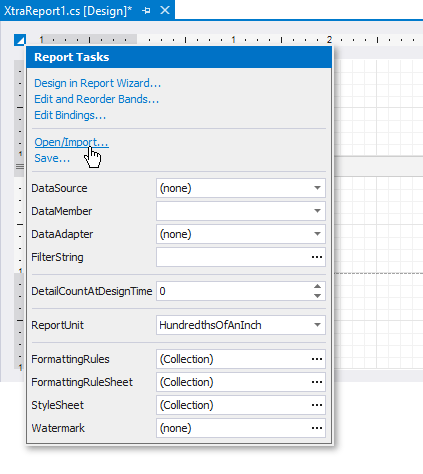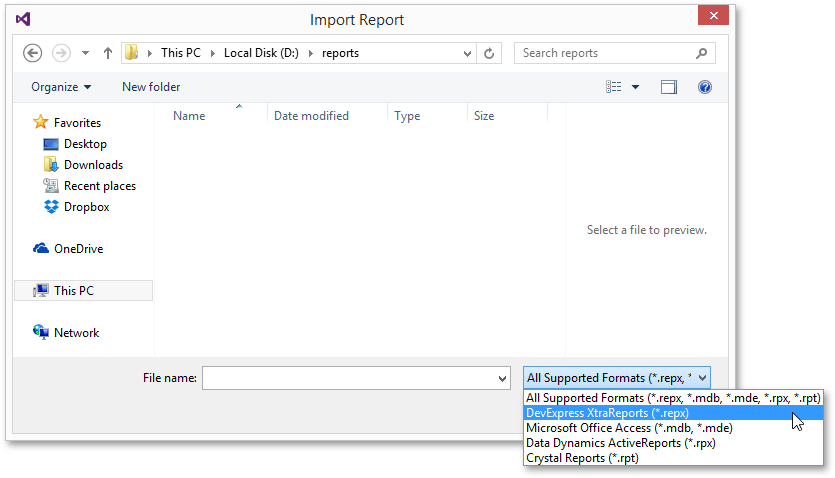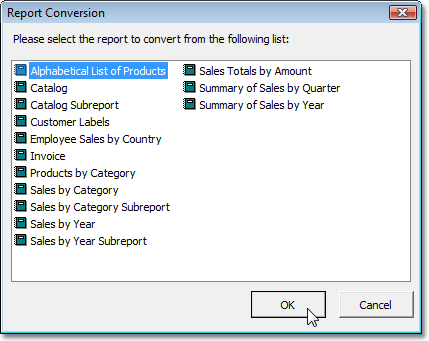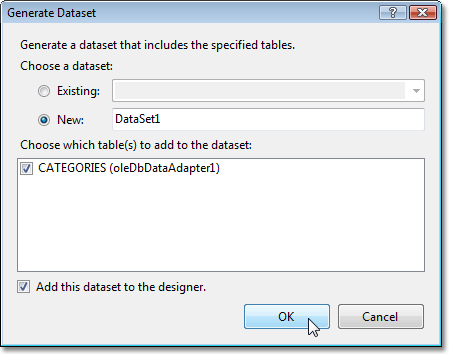Convert Third-Party Reports to DevExpress Reports
- 3 minutes to read
This document describes how to convert Microsoft Access reports, Crystal Reports, and Active Reports to DevExpress Reports.
Tip
The conversion tool has limitations. Customize the resulting report if it does not match the original after conversion.
Note
All trademarks and registered trademarks are the property of their respective owners.
Convert Third-Party Reports in Console
Use the conversion tool in two modes:
Convert multiple reports simultaneously
FOR /R Reports %R IN (*.rpt) DO ReportsImport "/in:%R" "/out:%R.repx"Convert a single report
ReportsImport /in:c:\0\crystal\file.rpt /out:c:\0\converted\testreport.repx
Convert Third-Party Reports in Visual Studio
Use the Visual Studio Report Designer to convert a third-party report and import the resulting report layout to a report.
Tip
The Visual Studio Report Designer allows you to convert only one report at a time. Use the conversion tool to convert multiple reports simultaneously.
Follow the steps below to import a third-party report.
Run the Open/Import… command in the Visual Studio Report Designer’s smart tag menu.

Select the file in the invoked Import Report dialog.

The conversion process starts if you select an .RPT report from Crystal Reports or .RPX report from Active Reports.
Do the following if you select an .MDB/.MDE database that includes Microsoft Access reports:
Specify a report to convert.

Choose whether to bind the created report to an existing data source or create a new typed dataset with the specified name.

Crystal Reports Conversion Specifics
If an .RPT report’s function cannot be converted, it is replaced with the “NOT_SUPPORTED” message. The following sample demonstrates the resulting expression:
| Crystal report | DevExpress report |
|---|---|
| isdate({report.Column}) | Iif(True, ‘#NOT_SUPPORTED#’, ‘isdate([Column])’) |
The conversion tool allows you to change this behavior and leave unrecognized functions in resulting expressions. Set the UnrecognizedFunctionBehavior parameter to Ignore when you run this tool.
ReportsImport /in:c:\0\crystal\file.rpt /out:c:\0\converted\testreport.repx /crystal:UnrecognizedFunctionBehavior=Ignore
The unrecognized isdate function is left unchanged in the following sample expression:
| Crystal report | DevExpress report |
|---|---|
| isdate({report.Column}) | isdate([Column]) |
Implement custom functions to support unrecognized functions in DevExpress reports (the isdate custom function in the sample above).
Requirements and Limitations
Crystal Reports
Requirements
Install Crystal Reports v13.0+ on the machine where you convert reports. Use the “Installation package for Visual Studio IDE“ package from the https://www.crystalreports.com/crvs/confirm/ website.
Limitations
Data sources are converted to SqlDataSource objects. Only the first SQL data source is used. It is assigned to the report’s DataSource property.
Data source tables from different databases are not joined.
- User credentials used to access data sources are imported without the password.
- Parameters with static values are converted without their Description.
- Parameters with dynamic values are converted without their DisplayMember.
- Subreports are inserted as empty controls with the original size (source reports are not assigned).
- Charts are inserted as empty controls in their original size.
- Pivot grids are inserted as empty controls with the original size.
GrapeCity ActiveReports
Requirements
Install Active Reports v11.0+ on the machine where you convert reports.
Microsoft Access
Requirements
Install Microsoft Access 2000 or higher on the machine where you convert reports.
Limitations
Subreports and expressions are not converted.
Next Step: Create a Simple Data-Aware Report